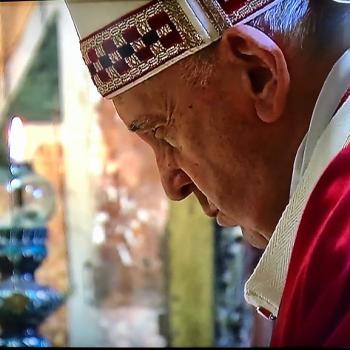The scene shifts to the top of the mountain, and YHWH is revealed to be furious, demanding Moses to descend the mountain, tell those Israelite scum that they are blasphemers and liars, no better than the stiff-necked pharaoh whom YHWH has earlier vanquished. And then YHWH says something truly terrifying: "Now let me alone, so that my anger may burn hot against them and I may consume them; but of you I will make a great nation" (Ex. 32:10). YHWH has determined to "swallow" the people and then repeats precisely the phrase that YHWH first uttered to Abram in Gen. 12:2. It is now Moses who is promised to be the founder of a great nation, free from the wretched Israelite refugees at last.
One might have expected Moses to say something like, "Whatever you say, boss," or perhaps "Great idea, YHWH; I can't stand these clowns either and you and I are well rid of them!" But he does not. He in fact saves them all with some quite incredible arguments and demands for YHWH. They are: first, the Egyptians will think you are an idiot, bringing Israel out only to kill them at the mountain; second, calm down, now, and don't bring evil on your own people; third, do not forget that covenant you swore with Abraham, Isaac, and Israel to gain an inheritance from you forever (Ex. 32:11-13). And "YHWH changed the divine mind about the evil planned for the people" (Ex. 32:14).
Thus, the people still "fondling" away at the base of the mountain, Moses takes the Commandments down to them. But the sight of the fondling is apparently too much for the old boy, because he smashes the tablets and demands an accounting of the mess from his deputy, Aaron. And now comes the question of leadership. "What did this people do to you that you have brought on them a great sin?" asks Moses, and Aaron proceeds to lie wantonly and unforgettably. He says, and I paraphrase, "Cool off, Moses! Who better than you know just how trashy these people are. They wanted some new gods—can you believe it?—and so I casually asked if anybody happened to have any gold, and they brought it to me. So I tossed it all in the fire, and lo and behold out popped this calf!" (Ex. 32:22-24)
Aaron hates the people and washes his filthy hands of them. In response Moses heads back up the mountain to plead—again—for their very lives. He asks for God's forgiveness of them, but says—in one of the Bible's great phrases—but if you will not forgive, "then blot me out of the book you have written" (Ex. 32:32). This could mean two things. Either Moses refuses to live in a world where YHWH will not forgive even grave sins like this or Moses is here offering his own life for the sinful people. Perhaps both meanings are to be found here. In any case, real leaders are willing to give themselves for the people, even when YHWH appears to have rejected them. Little wonder that Moses is still remembered as Israel's great leader and lawgiver. And Aaron? Well, he is still represented in all of us who try to have a both ways—worship YHWH and worship other gods? And when we are confronted with weakness and sin too often we try to escape and take no part of the blame. I fear that Aaron is alive and well and living in us. Would that Moses would appear in us far more often than he does.





